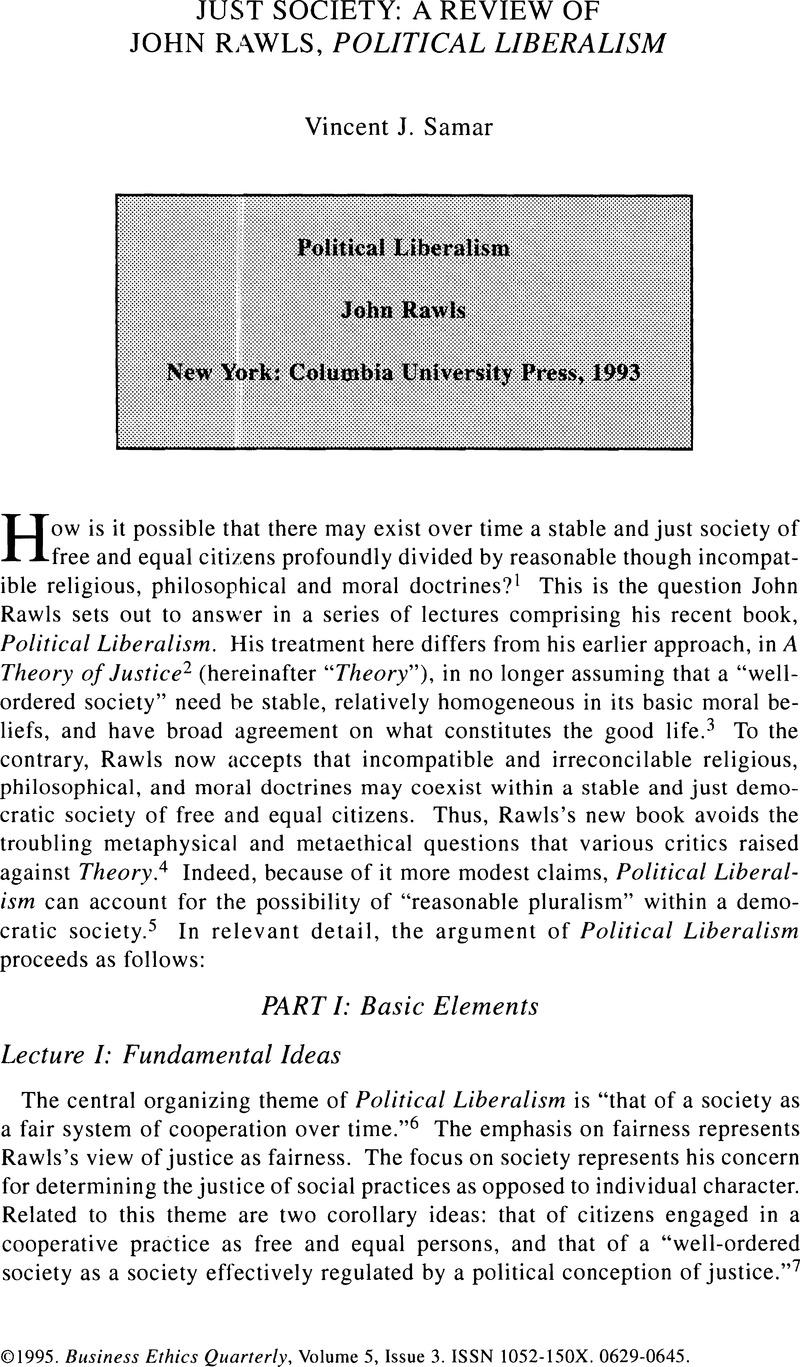Published online by Cambridge University Press: 23 January 2015

1 John Rawls, Political Liberalism (New York: Columbia University Press, 1993), p. xviii.
2 John Rawls, A Theory of Justice (Cambridge, MA: Harvard University Press, 1971).
3 Political Liberalism, p. xvii.
4 See Alan Gewirth, Reason and Morality (Chicago: University of Chicago Press, 1978), pp. 18-20, 108-9 (raising various metaethical objections); see generally Michael J. Sandel, Liberalism and the Limits of Justice (New York: Cambridge University Press, 1982) (raising, throughout the work, questions about whether Rawls’s conception of the parties in the original position presupposes a metaphysical conception of persons that is independent of and prior to all contingent attachments, including their various conceptions of the good); cf. Will Kymlicka, Liberalism, Community, and Culture (Oxford: Clarendon Press, 1989).
5 See John Burt, “John Rawls and the Moral Vocation of Liberalism” in Raritan, vol. 14 (1994), pp. 133-53 (showing how Political Liberalism provides a commitment to what liberalism means and how a liberal culture might live up to it).
6 Political Liberalism, p. 14.
7 Ibid.
8 Ibid., p. 22.
9 Ibid., p. 23.
10 Ibid., p. 10.
11 See Gewirth, p. 20.
12 Political Liberalism, p. 38.
13 Ibid., p. 40.
14 Ibid., p. 42.
15 Ibid., p. 49.
16 Unlike Kant, for example, Rawls is not attempting to deduce an ethical system from a principle of formal reasoning. Cf. Immannel Kant, Foundations of the Metaphysics of Morals, Lewis W. Beck trans., 2d ed. (New York: MacMillian, 1985).
17 See Gewirth, p. 108. Here it has been noted that the original position really provides a theory of justice as reciprocity rather than justice as fairness. Since the veil of ignorance prevents any real bargaining to meet the motive of mutual advantage, the principles that arise out of the original position will not be able to earn free assent. See Brian Barry, Justice as Impartiality, Vol. 2 A Treatise on Social Justice (Oxford: Clarendon Press, 1995) (developing a theory of justice as impartiality without relying on the idea of the original position), pp. 9, 57-58.
18 Political Liberalism, p. 93.
19 Ibid., p. 115.
20 Gewirth, p. 361; cf. Burt, p. 146.
21 See generally Richard Mohr, Gays/Justice: A Study of Ethics, Society and Law (New York: Columbia University Press, 1988); Vincent J. Samar, “A Moral Justification of Gay and Lesbian Civil Rights Legislation,” in Journal of Homosexuality, vol. 27 (1994), pp. 147-78.
22 Political Liberalism, p. 206.
23 Ibid., p. 211.
24 Ibid., p. 215.
25 Ibid., p. 223.
26 Ibid., p. 225.
27 Ibid., p. 231; see Cass R. Sunstein, The Partial Constitution (Cambridge, MA: Harvard University Press, 1993) (emphasizing the role of all three branches in the constitutional interpretive process), pp. 9-10.
28 See Bruce Ackerman, We the People, Vol. 1 Foundations (Cambridge, MA: Belnap Press, 1991) (explaining how constitutional decision making differs from normal legislative decision making), pp. 6-7.
29 Political Liberalism, p 247.
30 Ibid., p. 253.
31 Ibid., pp. 260-61.
32 See Daniel Brundney, “Hypothetical Consent and Moral Force” in Law and Philosophy, vol. 10 (1991), pp. 235-70 (explaining when an appeal to hypothetical consent has moral force and when it does not).
33 Compare Political Liberalism, p. 291 with ibid., p. 271 (where Rawls first introduces the principles).
34 Ibid., p. 290.
35 Ibid., p. 330.
36 Ibid.
37 Ibid., p. 332.
38 Ibid., pp. 271,291,333.
39 Ibid., p. 348.
40 Ibid., pp. 353-54; see Brandenburg, v. Ohio, 395 U.S. 444, 447 (1969).
41 See Cass R. Sunstein, Democracy and the Problem of Free Speech, (New York: Free Press, 1993), pp. 94-101; see also John Hart Ely, Democracy and Distrust: A Theory of Judicial Review (Cambridge, MA: Harvard University Press, 1980), pp. 101-104 (arguing that the appropriate role for judicial review is to prevent obstacles to full citizen participation in representative government and not to second guess legislative decisions about the substantive merits of political choices).
42 Political Liberalism, p. 367.
43 Ibid., p. 370.
44 See Gewirth, pp. 48-150.